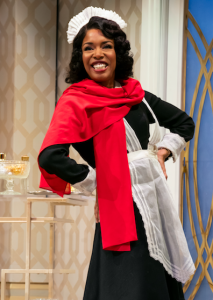
Credit: Joan Marcus
As L.P Hartley stated in his novel The Go-Between, “The past is a foreign country. They do things differently there.” In two current Off-Broadway productions, playwrights translate the unfamiliar people and events of previous decades employing modern sensibilities, creating a pair of fascinating portraits of America’s cultural, social and political history. From Signature Theatre Company, Lynn Nottage’s By the Way, Meet Vera Stark—ironically a revival of the original Second Stage production from 2011—employs a mix of satire and sharp observation to comment on African-American women’s depiction in popular media and how it affects their self-image. Jack Cummings III’s adaptation of The Trial of the Catonsville Nine reimagines Daniel Berrigan’s 1971 work on the infamous civil disobedience action he and other eight others took against the Vietnam War. Both give us startling and fresh visions of where we’ve been as a country.
Vera Stark is an amalgam of every black actress who had to mold herself to fit white perceptions of her sexuality, talent, and intelligence. But instead of a heavy-handed treatise of the evils of discrimination, the two-time Pulitzer winner Nottage delivers a screwball farce skewering reductive racial attitudes.
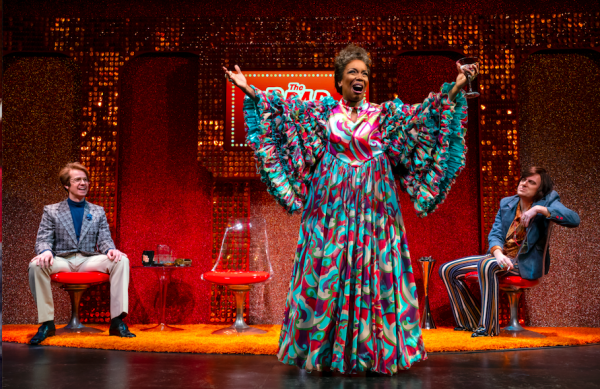
Credit: Joan Marcus
Nottage’s hilarious comedy opens in 1933 as Vera is working as a maid-companion for starlet Gloria Mitchell, “America’s sweetie pie.” They are rehearsing lines in Gloria’s gorgeous Hollywood home for a Southern epic with echoes of Gone with the Wind and Imitation of Life (amazing sets by Clint Ramos and fabulous costumes by Dede M. Ayite). The first act focuses on the efforts of the two women to land roles in the potentially career-making film. It’s gradually revealed Vera and Gloria are more than just boss and employee; they may be related. Their positions and those of Vera’s roommates Lottie, a talented singer who cannot find a job, and Anna Mae, who passes as Latin American to climb the ladder of fame, symbolize the oppression of women in the entertainment industry. Nottage takes aim at the rampant racism and sexism of the studio system as Vera and her colleagues subject themselves to stereotyping to advance. The second act is a weird double-filtered reconstruction of the title performer’s life as a trio of 2003 pretentious academics dissect a 1973 talk-show featuring an older Vera and Gloria.
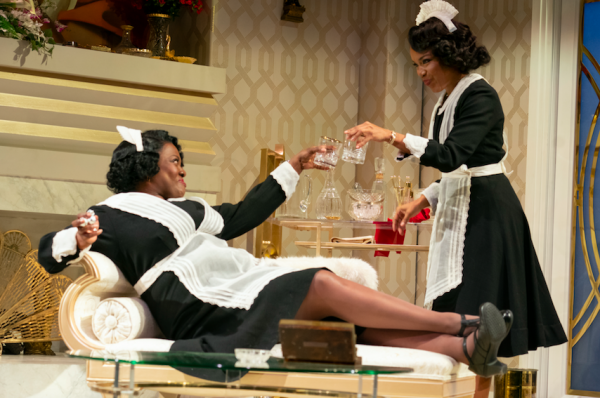
Credit: Joan Marcus
Kamilah Forbes’ staging is much broader than Jo Bonney’s 2011 version which works well in the more outrageous sequences such as Vera’s exaggerated impersonation of the white idea of a black servant as she auditions for the movie’s Russian director. Occasionally Forbes pushes too hard and the proceedings become more like a campy SNL skit than a canny commentary. Jessica Frances Dukes miraculously maintains Vera’s humanity through her many transformations. She is always a believable woman—charming, energetic and wily in Act One, still vibrant and no-nonsense in Act Two though she verges on parody of the song stylings of Lena Horne and Sarah Vaughan. Jenni Barber is riotously funny as the self-absorbed Gloria. Heather Alicia Simms, Carra Patterson, Warner Miller, David Turner, and Manoel Felciano double up in hilarious dual roles in this pointed examination of racial and sexual identity.
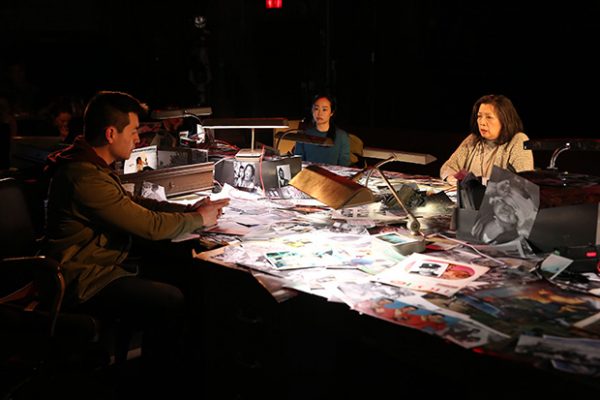
Credit: Carol Rosegg
Catonsville Nine, presented by Transport Group in association with the National Asian-American Theatre Company, also affords a bracing perspective on our twisted treatment of marginalized populations. As he did with I Remember Mama, The Boys in the Band, and Hello, Again, Transport Group’s artistic director Jack Cummings III takes an established work and refashions it in a symbolic setting.
In 1968, at the height of America’s military action in Vietnam, progressive priest brothers Daniel and Philip Berrigan and seven additional protestors stole over 700 draft records from an army facility in Catonsville, Maryland, and set them on fire with homemade napalm. Daniel made the resultant trial into a poetic script which played Off-Broadway and briefly on Broadway in 1971. (Can you imagine an equivalent serious work on income inequality or the Trump presidency on today’s Main Stem?)
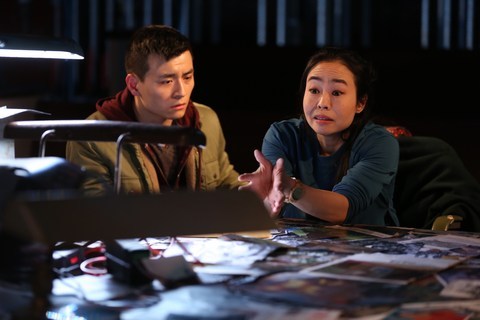
Credit: Carol Rosegg
Gordon Davidson’s original production featured a full courtroom set and a cast of 16 including young actors such as Sam Waterston, James Woods, and Michael Moriarty. Cummings places the action in a bizarre chamber of memory with just three Asian-American actors playing all of the roles. Set designer Peiyi Wong transforms the small stage of the Abrons Arts Center into a ghostly archive. The audience is seated in onstage pews surrounding several tables littered with clippings, photos, LPs, and other memorabilia of the era. The small cast enters from the empty auditorium wearing heavy winter clothes as if they came directly from the street outside. The extraordinarily versatile David Huynh, Mia Katigbak, and Eunice Wong shed their outer garments, examine the documents, and act out the trial, switching parts without ever losing the thread or creating confusion. Having Asian-American performers enact this story of the tragic ruin of an Asian country adds a layer of ironic resonance. To add to the contemporary perspective, Cummings has amended the script with updates on the various participants.
Fan Zhang’s sound design and original music and R. Lee Kennedy’s lighting get a tad overblown at times, obscuring the interactions between the intense trio as judge, witnesses and lawyers, but these are only occasional overreaches in an otherwise imaginative and haunting view of a shattering chapter of our recent past. Like Vera Stark, Catonsville causes us to re-examine the perceptions of our culture.
By the Way, Meet Vera Stark: Feb. 19—March 10. Signature Theatre Company at the Pershing Square Signature Center, 480 W. 42nd St., NYC. Tue—Fri 7:30pm, Sat 2pm & 8pm, Sun 2pm & 7:30pm. Running time: two hours and 20 mins. including intermission. $35. (212) 244-7529. www.signaturetheatre.org.
The Trial of the Catonsville Nine: Feb. 6–23. Transport Group at the Abrons Arts Center, 466 Grand St., NYC. Tue—Sat, 7:30pm. Running time: 80 mins. with no intermission. $60. (866) 811-4111. www.ovationtix.com.
